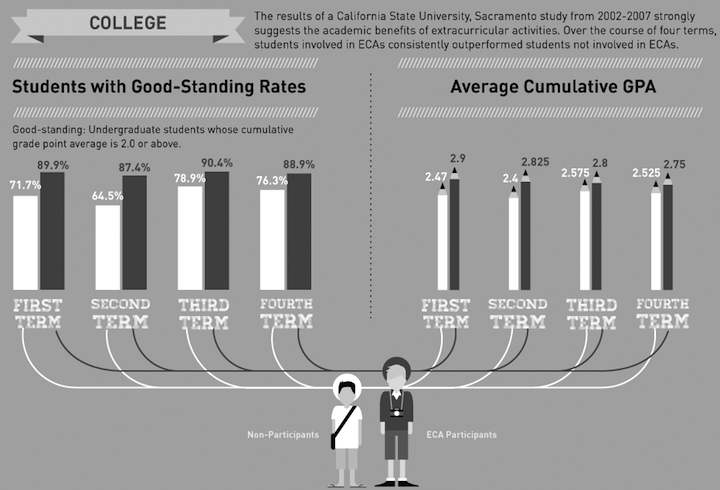Graduation requirements need revision
Graphic courtesy of CourseHero.
Involvement in a student organization is not something all students plan or seek out when they first arrive at college. Students join and drop out of organizations throughout their college career, rarely staying in one for a prolonged period of time.
Student involvement should be a mandatory rite of passage for graduation because it strengthens the bond between students and their university.
UND has 275 recognized student involvement organizations. Greek life is an obvious option. But there also are groups such as the 2nd Nut group, a sociology and psychology group based on people watching; the American Red Cross volunteer group which serves the local Grand Forks area; and SPILL, a private student listening and support group that assists students with a wide variety of needs and issues.
It’s not a graduation requirement for students to be a member of an organization, but perhaps it should be. There’s a student involvement theory by Alexander Astin that analyzes and validates the necessity for a college to have such a requirement placed upon its students.
According to Astin’s theory, academic performance is expected to rise when a student is involved in a student organization. The student involvement theory revolves around three core concepts.
The first is student input. The pre-college traits a student brings to their organization helps create diversity among the group.
The second is student environment — which the organization creates within the university — making it possible for students to maximize their positive college experience due to productive involvement.
Lastly is student outcomes through positive student characteristics that result from the students’ involvement within a university organization.
Participating in a student organization requires physical involvement and psychological dedication to the club. Participation varies from student to student and the rewarding outcome directly correlates to the time the student invests in the organization.
UND should require students to be involved in an organization of their choice at least one semester during their freshman or sophomore year for a minimum of two hours per week.
To prove involvement, a sign off sheet would be validated by the organization president with a pass/fail grade based upon a 75 percent participation rate.
Some students may be against making this minimal obligation a graduation requirement. Their argument may be that they don’t have time to be involved in a student organization, and if they were made to do so, their grades would be negatively impacted since participation would take away from class study time.
I would argue many students need an extra nudge to become engaged, making co-curricular involvement a graduation requirement may be just the nudge they need.
A positive outcome of this would be the opportunity to broaden their network. Students will be more likely to come in contact with other students who share similar interests. Connections made while in a student organization may provide a great social and professional networking web.
Often, one or more instructors are involved in student organizations since it’s a UND code that clubs need to be represented by a faculty member.
This involvement gives students a chance to interact informally with professors in a more comfortable environment than the classroom.
Another great benefit is resume building. Employers want to see related work experience and student involvement practices. A student can combine these by becoming involved in a club related to their academic major. Career goal clubs also expose students to additional learning experiences beyond the classroom.
At times, students experience negative encounters with school officials, professors or other students. These experiences sometimes lead to withdrawal or poor academic performance. Some student organizations can assist students to cope with their transition into college life and social situations, which helps to restore a positive university attitude.
There is a student involvement expo at the start of every semester, so stop to look at all the options for new learning and relationships by joining an organization.
By actively practicing the student involvement theory, UND would have a higher student retention rate due to a rise in students’ bond to the university and their overall university experience satisfaction.
Margaret Upton is a columnist for The Dakota Student. She can be reached at [email protected].










